Earning Money by Renting Your Apartment: Short-Term vs. Long-Term Rental. Which Option Should You Choose?
Renting out your apartment can be an excellent source of income, but deciding whether to go for short-term or long-term rentals can be a challenging decision. Both options have their own unique advantages and disadvantages, and understanding them will help you make an informed choice. Let’s delve into the pros and cons of each option.

Short-Term Rental:
Short-term rentals, typically facilitated through platforms like Airbnb or Booking.com, involve renting out your property for a few days or weeks at a time. Here are the advantages and disadvantages of this option:
Pros:
- Higher Earnings Potential: Short-term rentals often generate higher income per day compared to long-term rentals. This is because you can charge a premium for the flexibility and convenience offered to travelers.
- Flexibility: With short-term rentals, you have the freedom to choose when to rent out your property. This flexibility enables you to use your apartment whenever you need it.
Cons:
- High Turnover and Maintenance: Frequent guest turnover requires more cleaning and maintenance work. It may also lead to increased wear and tear on your property.
- Uncertainty: Short-term rentals are subject to market fluctuations and seasonal demand. Your earnings may vary significantly depending on the time of year and local events.
Long-Term Rental:
Long-term rentals involve leasing your apartment for an extended period, usually six months or more. Consider the following pros and cons of this option:
Pros:
- Stable Income: Long-term rentals provide a reliable monthly income, ensuring a more predictable cash flow.
- Reduced Effort: With long-term rentals, you have fewer turnovers, which results in lower cleaning and maintenance responsibilities.
Cons:
- Lower Earnings Potential: Compared to short-term rentals, long-term rentals generally yield lower income per day.
- Limited Flexibility: Once you have a long-term tenant, it becomes challenging to use your apartment for personal purposes. You are bound by the lease agreement until its expiry.
Choosing the Right Option:
Deciding between short-term and long-term rentals depends on your specific circumstances and goals. Here are a few factors to consider:
- Location: If your apartment is in a popular tourist destination or a city with high demand for short-term rentals, it may be more profitable to opt for short-term rentals. Conversely, if you are in an area with limited tourism or stable long-term rental demand, long-term rentals might be a better choice.
- Personal Use: If you want the flexibility to use your apartment whenever you desire, short-term rentals allow you to block out dates for personal use. However, if renting out your apartment is solely for income purposes, long-term rentals may be more suitable.
- Risk Tolerance: Short-term rentals tend to have higher occupancy risks due to market fluctuations. If you can handle the uncertainty and are willing to put in the necessary effort, short-term rentals might be worth considering.
In conclusion, both short-term and long-term rentals offer their own set of advantages and disadvantages. Analyze your location, personal preferences, and financial goals to make an informed decision. Remember, there is no one-size-fits-all solution, and what works for others may not work for you. Evaluate your options carefully, and you’ll be on your way to maximizing your rental income.



